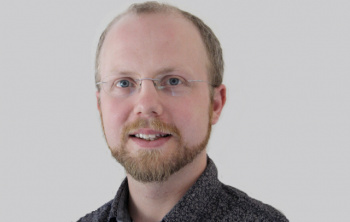News
Queen Mary researcher receives €2 million grant to develop more efficient solar technology
17 December 2020

Dr Joe Briscoe
For this project Dr Briscoe will explore how a type of material known as ferroelectrics could be used to produce a new class of solar energy device that could break current efficiency barriers.
The ERC Consolidator Grants are awarded to outstanding researchers with between 7-12 years of experience after PhD, and a scientific track record showing great promise. Dr Briscoe was one of 50 UK-based recipients of the 2020 ERC Consolidator grants, which are part of the EU’s current research and innovation programme, Horizon 2020.
Speaking on his award, Dr Briscoe said: “I’m delighted to have been awarded this competitive grant. This achievement has been several years in the making and I’m excited to finally get started on this important project, which could make solar energy a much more viable option to meet future energy demands.”
Combining materials for improved efficiency
Whilst the cost of solar technology has decreased in recent years, the efficiency of solar devices has stayed largely the same as this property is fundamentally limited by the current approaches used to convert light into electricity.
Ferroelectrics are class of material that have been shown to produce electricity when illuminated in a different way to conventional solar cells, suggesting that these materials could offer potential for creating more efficient solar technology.
In this project, Dr Briscoe will develop tiny ferroelectric structures and combine them with existing solar cell materials in an effort to create a new type of solar energy device with higher efficiency than devices created with either type of material alone.
Dr Briscoe, said: “By studying the nanoscale interactions between ferroelectrics and current solar cell materials I hope to gain a greater understanding of these interactions, and use this information to design future solar technologies that could break current efficiency barriers.”
“If we’re able to push up the efficiency limit of current solar technology, we could produce solar energy at much lower cost, making it even more viable to meet future energy needs. Producing more efficient solar devices could also support other developing technologies, such as photocatalysis, which aims to directly convert solar energy into fuels like hydrogen. At the moment these technologies are not commercially viable due to the low efficiency of photocatalysts made from affordable materials.”
The ERC Consolidator Grants are awarded to outstanding researchers with between 7-12 years of experience after PhD, and a scientific track record showing great promise. Dr Briscoe was one of 50 UK-based recipients of the 2020 ERC Consolidator grants, which are part of the EU’s current research and innovation programme, Horizon 2020.
Speaking on his award, Dr Briscoe said: “I’m delighted to have been awarded this competitive grant. This achievement has been several years in the making and I’m excited to finally get started on this important project, which could make solar energy a much more viable option to meet future energy demands.”
Combining materials for improved efficiency
Whilst the cost of solar technology has decreased in recent years, the efficiency of solar devices has stayed largely the same as this property is fundamentally limited by the current approaches used to convert light into electricity.
Ferroelectrics are class of material that have been shown to produce electricity when illuminated in a different way to conventional solar cells, suggesting that these materials could offer potential for creating more efficient solar technology.
In this project, Dr Briscoe will develop tiny ferroelectric structures and combine them with existing solar cell materials in an effort to create a new type of solar energy device with higher efficiency than devices created with either type of material alone.
Dr Briscoe, said: “By studying the nanoscale interactions between ferroelectrics and current solar cell materials I hope to gain a greater understanding of these interactions, and use this information to design future solar technologies that could break current efficiency barriers.”
“If we’re able to push up the efficiency limit of current solar technology, we could produce solar energy at much lower cost, making it even more viable to meet future energy needs. Producing more efficient solar devices could also support other developing technologies, such as photocatalysis, which aims to directly convert solar energy into fuels like hydrogen. At the moment these technologies are not commercially viable due to the low efficiency of photocatalysts made from affordable materials.”
| Contact: | Vicky Kwaku |
| Email: | v.kwaku@qmul.ac.uk |
| People: | Joe BRISCOE |
Updated by: Vicky Kwaku




